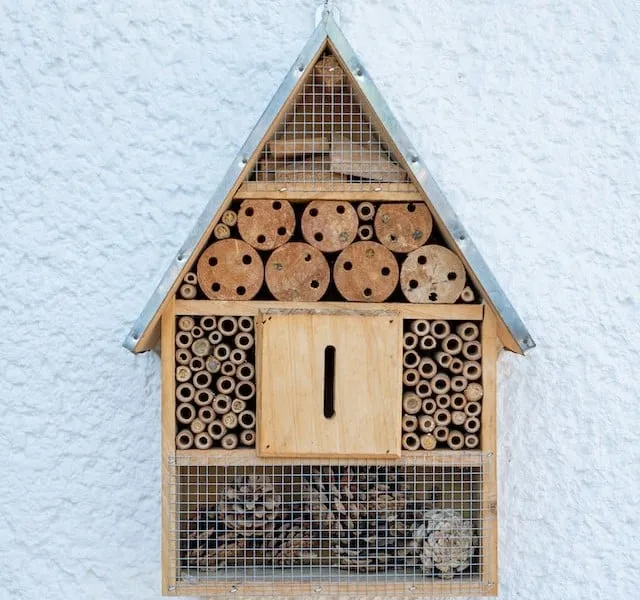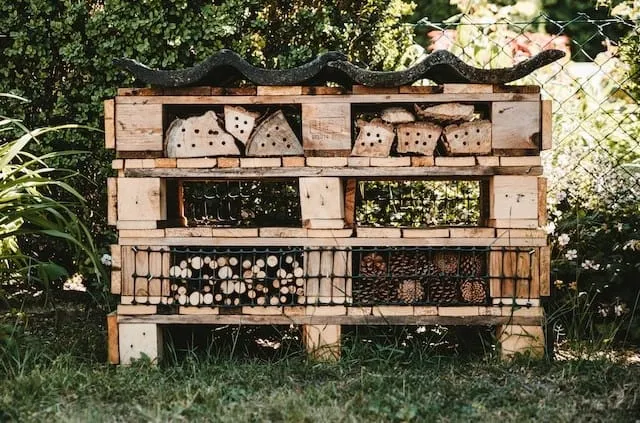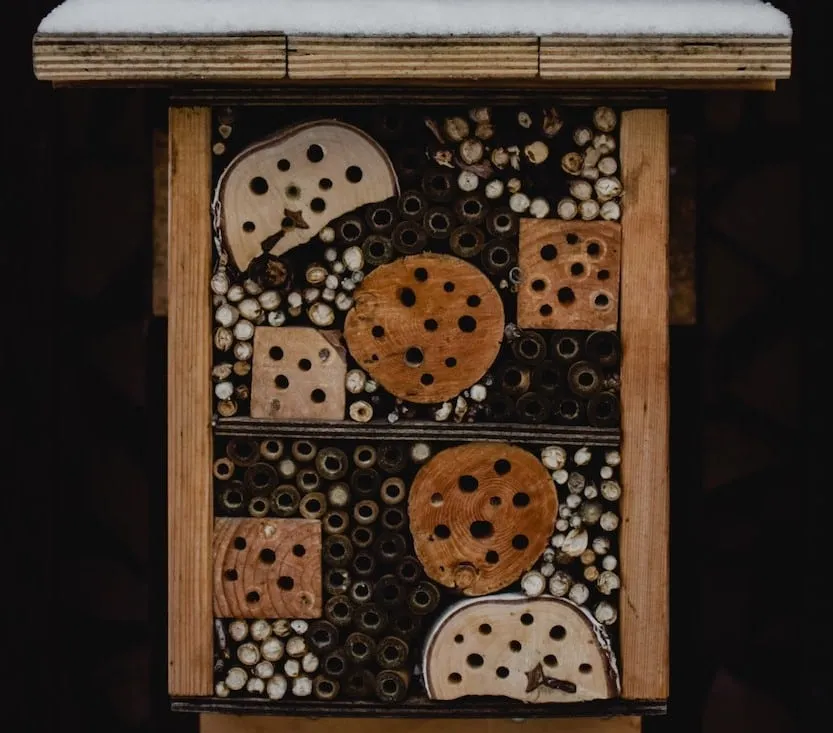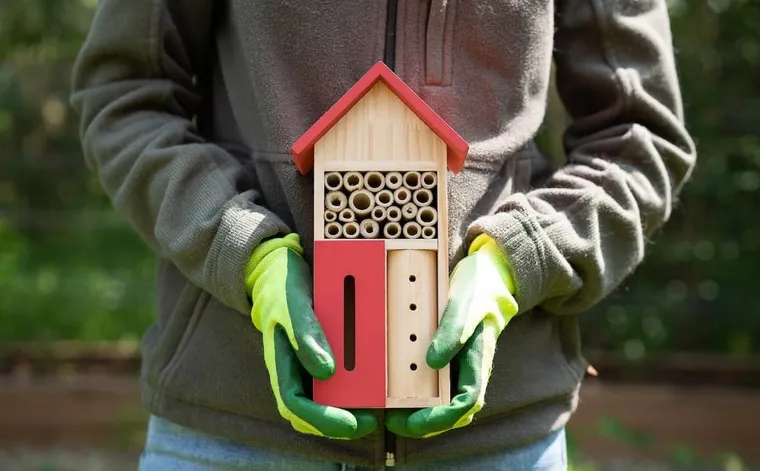Do you have a neighbor who seems to have built their house with their bare hands, isn’t keen on the monthly neighborhood barbecue, and probably hasn’t been to the state line? They could be the human embodiment of a mason bee. These cousins of the honey bee prefer to be a one-bee army.
Mason bees lay their eggs and feed them in a very efficient way. They do not need honey because they only need to live long enough to reproduce and set up a ‘nutrition’ fund for their offspring.
They do this by creating little compartments in tube-like structures, and each section has a pollen pellet, an egg, and a mud wall for protection.
This ingenious creation and placement ensure that when the egg hatches, all the nutritional needs it has can be satisfied.
This compilation-style post will explore some of the most highly rated and best mason bee houses that they will love to call home.
What is Hot in Mason Bee Real Estate?
The dream is to find a tube that a mason bee can call its own. I’ve even read about mason bees making homes out of the wheels of plastic garbage cans. Some species find a space that works, build a clay wall cylinder, and move in.
All the mason bees are looking for is a space that they can move into. Unlike a carpenter bee, they won’t drill any holes, so they are not destructive. They are masons, so they build.
They’ve taken a fancy to cylindrical holes. These holes attract mason bees to find shelter from the elements. A little cover from the rain is what they ask for. They tend to favor a tight fit and have been known to move into an abandoned brood comb in an empty hive.
It is best to present them with a variety of cylindrical sizes and see which ones they prefer. It’s better than having identical tubes that they don’t appreciate. Besides, nature isn’t symmetrical.

Once they’ve found the best structure to renovate to their liking, they need to make sure the location is ideal. They need building material, which is usually mud or resin.
They also need to feed themselves and pack some for the offspring. The nectar is for the adults; the pollen is for the emerging larvae.
They also need to be warm enough to work. Therefore, the location of their habitat should receive maximum morning light to give them a good start to the day.
Once you can provide these conditions, you and the mason bee shall become very good friends.
8 Best Mason Bee Houses
1. Mason Bee House by the POLLIBEE Store
This mason bee hotel might be my favorite one yet. Aesthetically, it has much to offer. But what keeps it more attractive for me as the best mason bee house is the fact that it is built with the mason bee as the key customer.
No installation is needed when you buy this bee house, as it comes fully assembled. Its ready-to-use feature makes it more exciting for an eager bee enthusiast. With a suspension design, just hook it up and hang it on garden walls, fences, trees, or pretty much anywhere you can find a spot.
The metal roof does a great job shielding it from the elements. It’s waterproof to guard against erosion and to prevent rain from getting to the parts that are meant to keep the bees comfortable and dry.
Some of the other designs aren’t so straightforward, and you should spend more time enjoying the services of the bee, not trying to figure out how the house can defy gravity.
With various filling materials, this bee hotel is more likely to attract many pollinators. Once the mason bees move in one year, you’ll have visitors every spring, and that’s always a good sign.
2. SunVara Mason Bee House for Pollinating Bees
SunVara Wild Pollinator Mason Bee Habitat | Garden Bee House | Hanging Bee House Pack 2
See on AmazonThis mason beehive is a simple teardrop-shaped structure made from bamboo tubes that include several tubes for female mason bees to lay their eggs in. Bamboo tubes are especially great because of their durability.
The tubes come in different sizes, so it’s possible to attract not merely mason bees. Leafcutter bees and other species of solitary bees may also take residency within. That’s good for the pollination of your garden and offers a home to other helpful insects.
The potential downside to this is that, unlike other varieties, it does not have a protruding roof that keeps the rainwater at bay. This is easily remedied by nailing a board above it.
You may need to add a few more tubes in to keep them stationary and keep the little cylinders from falling out.
3. Nature’s Way Bird Products PWH1-B Purple Bee House
Nature's Way Bird Products PWH1-B Purple Bee House
See on AmazonThis mason bee house not only improves pollination in your garden but enhances it aesthetically.
Bamboo tubes of different sizes invite bees of various sizes to settle within and live near your garden. It’s great to see tubes of different sizes that allow the house to shelter more than one species of bee (mason bees, carpenter bees, and leafcutter bees). It’s a great conversation piece and has the potential to convert everyone to a bee lover. A wide variety of pollinator bees can be accommodated in this bee house type.
The pre-drilled wood blocks that go with this design also house other solitary bees and wood-boring insects that prefer living in wood blocks.
The main structure works like a house, shielding the tubes and holes from environmental elements.
With its aesthetics, it would not be surprising when mason bees would easily get attracted to it, too!
4. Niteangel Natural Wooden Insect Hotel
Just like human hotels, this mason bee house was designed to appeal to a mix of different insects. It’s made from natural materials, making it safe for your six-legged guests, and offers different-sized tubes to appeal to different species of bees, thereby increasing your pollination power.
This mason bee hotel is pretty small, so it’s ideal for the little garden you have going in your backyard. Last but not least, it is so beautiful you may take a picture of it, frame it, and place it above the mantelpiece. The design keeps it dry in the rain, and if you set it up in time, you can have occupants within days.
5. Wildlife World Interactive Mason Bee Management System House
Wildlife World Interactive Wooden Bee House - Pollinator Bee Management System
See on AmazonThis wooden house for mason bees is wonderfully unique. It’s like a multi-storied bee house with prefabricated layers and is assembled on-site, with one section on top of the other. This makes it easier to inspect and clean.
Harvesting cocoons is quite simple with this design. It’s pretty easy to take apart. Its shape makes it possible to place it on a stand if you choose not to mount it against your house or a tree. The holes appear to be the same size, so you might not have much diversity, but you’ll definitely get your masons.
6. Hewewor Store Wooden Mason Bee Box with Bamboo Tubes
The folks at Hewewor Store have really outdone themselves with
.
Not only have they provided the housing unit for the bees, but it also lasts for years.
The bamboo tubes are longer and provide a better bee habitat. It comes with about 90 mason bee nesting tubes.
To save you some effort, this Mason bee kit comes with a rope and metal wall buckle, making it easier for you to hang it anywhere around your yard or home.
This bee hotel not only provides a safe environment for the mason bee population. It adds aesthetics to your home, too.
7**. Bamboo Tube Mason Bee House (Pink) by Cestari Kitchen**
What a dainty little structure. Function and structure rarely come together as beautifully as they do in this little pink mason bee house .
The roof extends over the entrances of the tubes by almost two inches, which will definitely keep the masons dry during wet weather.
It’s fascinating to watch them sit at the entrance, looking out, waiting for a wet spell to pass. You can almost hear them sing the ‘rain, rain, go away’ song.
The nesting tubes vary in size, so you are likely to attract different types of solitary bees. What amazes me about these creatures is they don’t move into the tube that you’d expect. Sometimes they go for the tighter fit.
It’s a great learning tool for you or your children, and the vibrant color would liven up your garden shed for sure. As one of the best mason bee houses, it makes for a great gift for any nature lover.
8**. Welliver Outdoor Standard Mason Bee House**
Welliver Outdoors Standard Mason Bee House
See on AmazonSuccess stories of this mason house are numerous. It’s small but sturdy.
To mount it, you would have to get out your toolbox and get it to sit on a bracket on a wall. Alternatively, you could set it up to sit like a mailbox on a stand.
The wood is a little heavier than you’d expect, so it is likely to stay put wherever you set it up. If you put it up in the early spring, you’re likely to get bees moving in almost immediately.
The tubes are all the same diameter and are made of paper, which the bees seem to love. Perhaps it reminds them of the reeds they would usually move into in the wild.
Once again, the entrance to the tubes is sheltered against rain, but you will need to consider a location that protects it from strong gusts of wind whilst being exposed to maximum morning sunlight.
The structure is very well built, and no doubt, the masons are likely to appreciate it.
Mason Bee House on a Budget
If you’re handy with a saw and enjoy making builds, you could build one for yourself.
It may not have as much aesthetic appeal, but if you learn more about the bees you’re hoping to attract, then you will understand how best to set up a habitat for your pollinator friends.
What if crafts aren’t your thing? You could try making one out of a can. What you need to focus on is getting the right material for the tubes. Natural materials work best because they breathe.
Paper tubes or straws work very well for this type of house, and they come in various sizes. You could also make use of cardboard tubes to make nesting tubes. With these materials, you would have built your own mason bee house with replaceable nesting tubes for bees and other beneficial insects.
You would have to provide some shelter from the rain, but that wouldn’t be too difficult.
Don’t worry about purchasing mason bee cocoons. In most cases, if you build them a bee house, the mason bees will come.

Why Should You Care About Mason Bees?
Unlike their honey-producing counterparts, several species of mason bees are native to the U.S.
That makes them ideal for the ecosystem because they have figured out how best to work with the flora that we’ve got.
Since mason bees do not live in a colony, their care needs are very few, and the benefits we get from them are great.
Mason bees are fantastic pollinators. There are trees whose flowers have less sugar in their nectar than the honey bees find ideal.
As a result, when faced with options, the honey bees will happily bypass such blossoms, such as those on pear trees.
And yet, we still get pears when the season comes around. That’s because other bee species have taken a liking to such plants and kept our cravings satisfied.
Even though the claim that every third bite you eat was made possible by a bee is still yet to be proven, there’s no doubt that there are trees and plants that heavily rely on cross-pollinators.
So if you have a garden and you keep it chemical-free, attracting mason bees should become a priority for you.
Unlike honey bees, mason bees don’t travel far to forage, so if you can provide a good source of nectar and pollen in your garden, they will remain loyal residents of your mason bee houses.

Wrapping Up the Best Mason Bee Houses and Your Next Step
Solitary bees ask so little from us. A place to lay their eggs is nice, but it’s a secondary need.
Their primary requirement is a safe environment for them to forage.
The best way to be a friend to these helpful creatures is to keep chemical use in the garden/lawns to a minimum and eliminate it altogether where possible. In exchange, they will keep us fed for generations to come.









Worth a mention that none of the houses above have liners, though a couple do appear to use cardboard tubes. I've had mixed luck when using bamboo or other materials that are difficult to open and so was unable to extract and clean the cocoons. I noticed far too many bees last summer that were plagued with mites.
This year we're using only cardboard tubes, or paper liners and plan to remove and clean the cocoons at the end of the season which will hopefully reduce the mite impact.
I was thinking about using old plant stems, notably onions which have hollow stems. Would that work for mason bees? Is there a preferred diameter for the holes?
Can you use cinnamon stick vs. bamboo in building Mason houses for bees? If not, after you cut bamboo how soon can you build with it? What diameter should the opening be on the bamboo? Pictures are hard to tell.